What are student led parent teacher conferences? Exactly what they sound like.
In individual conferences:
- Students reflect across the year on the powerful learning that changed them.
- Parents sit in awe.
- Teachers support children as needed.
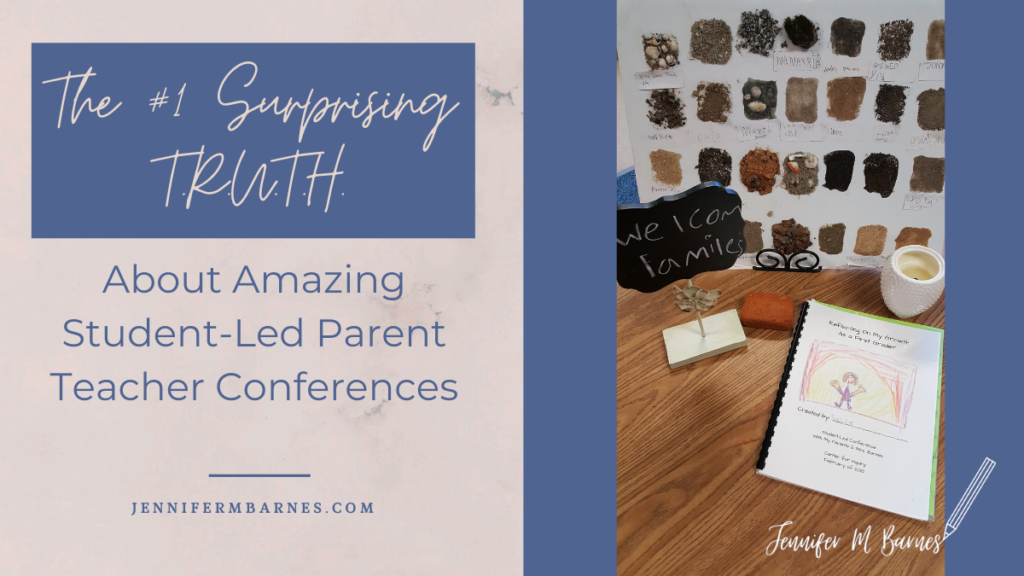
Since 1999, I have had the privilege of working alongside almost 500 children as they prepared, wrote, gathered artifacts, practiced, and hosted student-led conferences for their families. During all these years, I learned to listen and follow the ideas of my students. Because each class delved into different units of inquiry over the years, their conferences should have been just as unique.
So, here’s the truth about student led parent teacher conferences.
No matter what image anyone wants to portray about their child’s successful year, nothing highlights progress over time as effectively as a student-led conference.
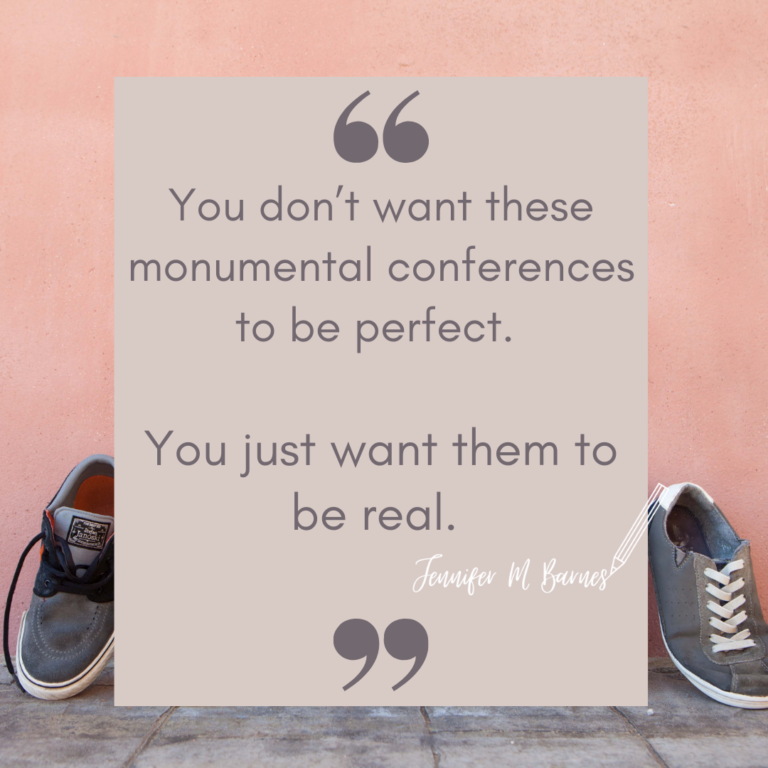
And here’s the biggest secret of all:
You don’t want these monumental conferences to be perfect;
you just want them to be real.
Conferences planned by five- and six-year-olds should look like five- and six-year-olds planned them. They should be:
- Messy.
Their appearance should be quite similar to the little one who created them. The examples of kids’ real work should exemplify the work they do every single day.
- Ripped.
Torn papers mean that kids have looked twice, tried to erase, have considered editing. As five-year-olds! Who does that? If your little one is attempting edits at this young age, that is something to celebrate.
- Real.
The work these young children select should look similarly to their typical caliber of work from Writing Workshop, their sketch pad, or demonstrations they have engaged in. If parents see such highly-edited pieces they can’t even imagine belonging to their child, the goal has not been met. Parents should not be developing a false sense of their children’s work. Plus, if the child’s pieces are so edited, the parent will believe their child cannot work successfully from home or they (the parents) are not teaching appropriately or helping their child as they should.
Capturing Data Over Several Years’ Time
One beauty of my life with these student-led conferences is that I had the privilege of looping from kindergarten to first grade. So I spent much time affirming children’s best efforts and authentic work samples during kindergarten. Then in first grade, it was clear for the parents to see the obvious growth in development an entire year later.
Questions always surfaced once people understood I had coached close to 500 kindergartners and first graders through student-led conferences. They begged me to start at the beginning.
“Jennifer, how do you really pull off these student led parent teacher conference days?”
A step-by-step guide for student led parent teacher conferences
Day One (“Reflecting on Us as Scientists”)
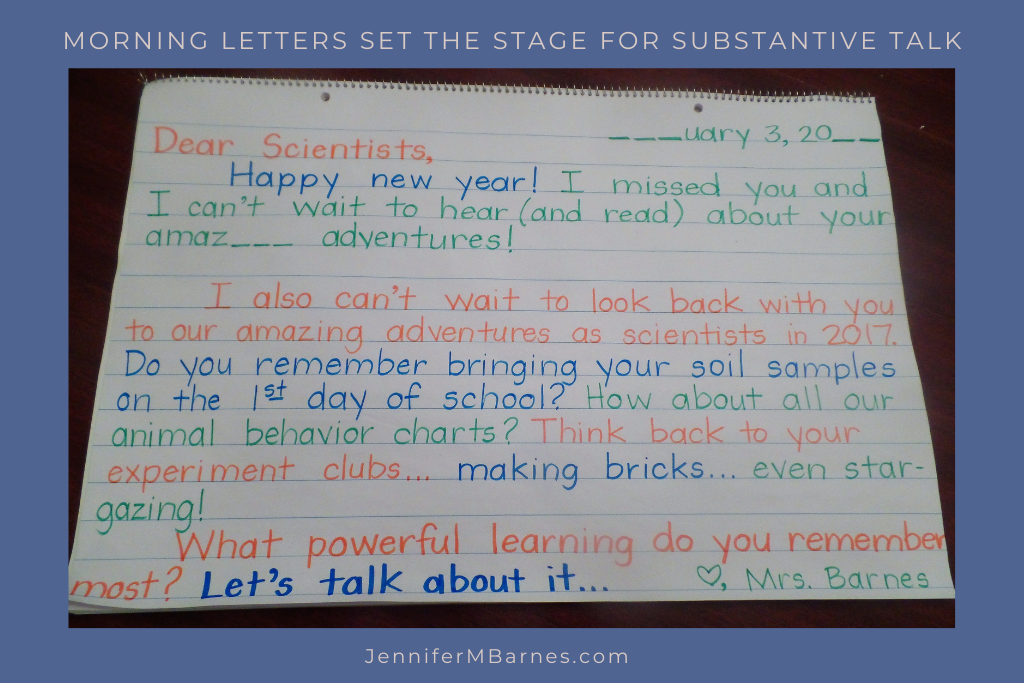
first, beginning with Our Class Morning Meeting
(about a month prior to the actual conference date. Note: I usually inform parents then, too, that the day is coming up so they can select their choice of preferred times. For me, this was January.)
Through the typical daily morning letter, introduce the concept of reflecting back over the year as scientists. Frame the conversation around, “If you want to know about us as scientists, you need to know…” (Much more about the origin of this term below…)
Question: Why do you start with “Kids as Scientists” first?
Note that I typically started with Science because children could look around the room, see their experiments, peek into their science museum, recall the experiences they shared. What inquiry units have they done already – water, quilts, birds, astronomy, gardens? As ideas pop into student’s minds naturally during the conversation, simply write their thoughts on chart paper. Leave the chart paper there.
Next, during the daily routine of the morning, as other ideas come into kids’ heads, add them to the list. I also remind them about the resources they have in their three-ring binders and Writing Workshop folders, their wall displays and their Learning Logs that could be evidence of this powerful learning as they prepare for student led parent teacher conference days
Later, in Writing Workshop
At Writing Workshop (later that morning), tell the children they have the opportunity to write down the most significant things they individually remembered from their lives as scientists. Remind them to think deeply about all the ways they’ve grown as scientists and read along with you once more. And then, put the chart away!
Pro Tip for student led parent teacher conferences
(Note: You must close the chart and put it away. There’s always at least one child – or more – who worry that they’re not doing the prompt “right” and will simply copy the words they see in front of them. Which would be hazardous for an effective student-led conference later!)
Suggested Art to Add to Student Led Parent Teacher Conferences
Especially during this very first time of personal reflection and writing, you will have to encourage like crazy to inspire them to jot some ideas down. One powerful suggestion is that of drawing. Many times, little kids are more open to drawing something they remember rather than try to figure out how to write it. It’s important to realize that some children feel quite confident discussing their science understandings and drawing pictures that matter to them. Reluctant writers might be simply hesitant to jot their thoughts down. It doesn’t mean they don’t have reflective responses.
Some suggestions:
- Replicate a sketch from their science sketch pad.
- Draw a picture of a science experiment that most influenced their new learning. Remind them about their observation of birds at the bird feeder or the insect homes they discovered in the school garden.
- Create a visual of an item they contributed to our science museum.
Wanted: Talking Points for Powerful Student Led Parent Teacher Conferences
Question: How many words do I expect children to write?
It honestly depends upon the child.
Are they showing deep thinking in their growth as scientists?
Have they considered the full range of topics we’ve covered thus far in science?
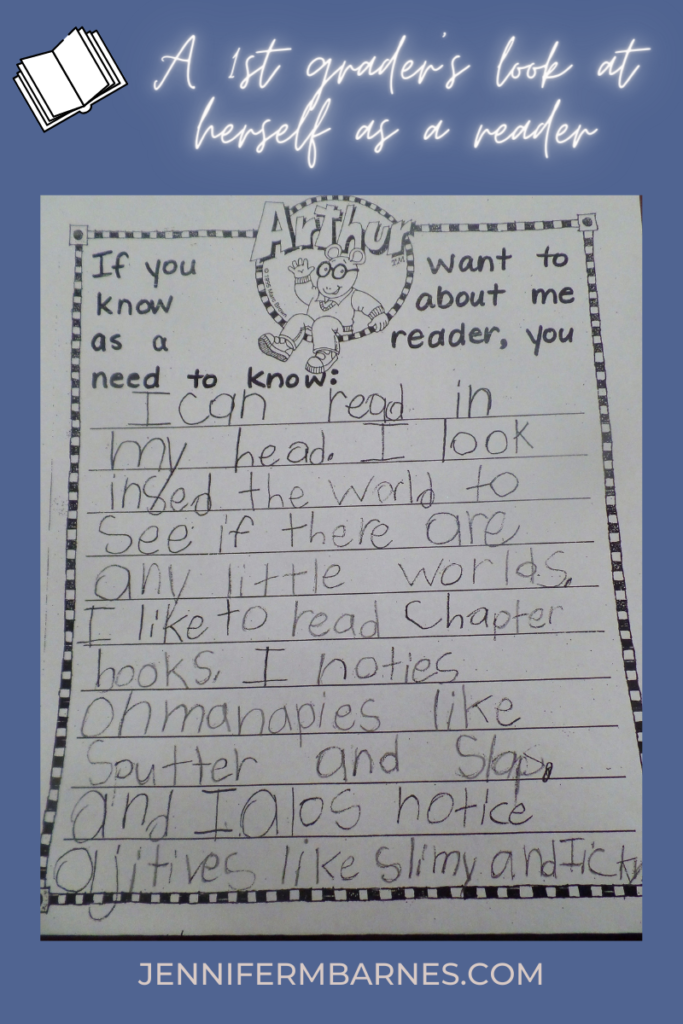
Perhaps, I consider this question from another viewpoint. It’s not so much how many words I expect to see, but rather how much talking they can do with the writing and drawing hints they leave.
To stimulate those thought-provoking points, sometimes I suggest documenting:
- One best sketch,
- Something from our water study,
- One scientist you were most inspired by,
- Important science tools used, or
- Something empowering you learned about.
Several other phrases that could elicit more thoughtful reflection with little children are:
- “Before kindergarten, I used to believe ______
But now I know ________.”
- “Some ways I believe I’ve changed as a scientist are __________.”
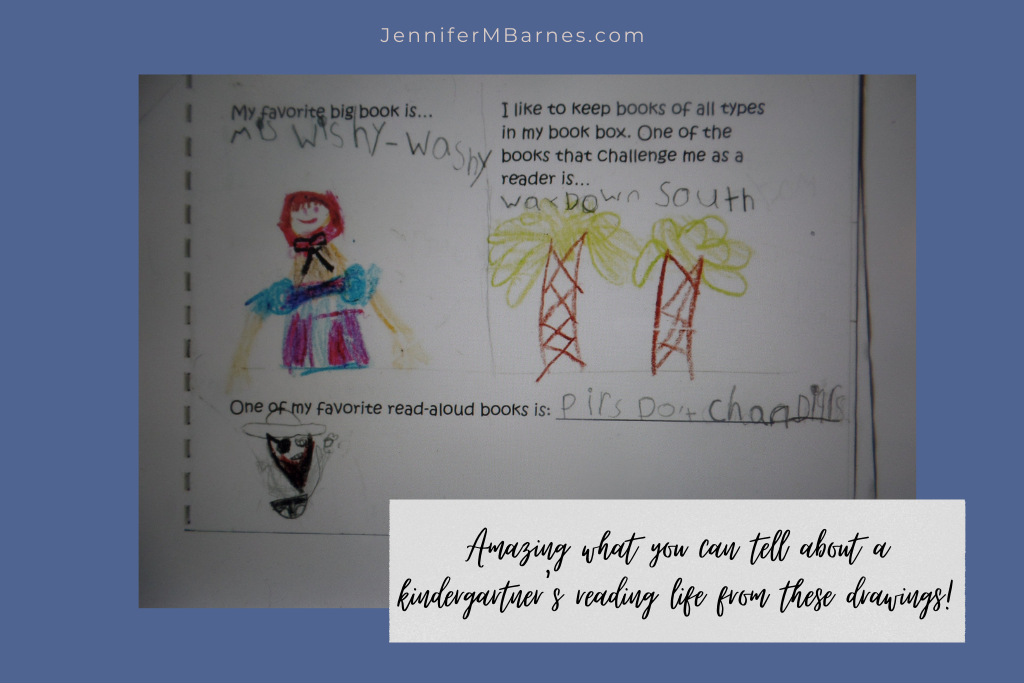
As far as documenting their ideas with words and pictures
Over the years, we’ve gone different routes. Sometimes I’d simply give them a blank sheet of paper with the heading “If You Want to Know About Me as A Scientist, You Need to Know…” at the top.
Once, I had a group of children share that they wished for “boxes” (more definite borders to help organize their thinking.) Subsequently, together we created a t-chart, separating their paper into fourths. Each of their ideas, writings, and drawings could go in a different quadrant.
Finally, towards my last years of teaching, I’d distribute index cards to collect their thoughts. They would tape all their documentation to a poster-sized paper. How engaging to see all their reflections at one time!.
Lastly during COVID, they decided to collect post-it notes on a planning sheet. That way, I could make a copy of the sheet for my use during their virtual conferences. At the end of the process, they could take home their artifacts along with their planning sheet on the day of the conference. I’d join them from school and hold up the class displays, projects, and books they shared about.
Our Varying Phrases used in the process of creating student led parent teacher conferences
Words are important. The language we use with children is critical. In keeping our ideas open-ended, each child could approach the engagement at their level of experience and come out of it successfully.
Once during one of our teacher Curriculum Conversation meetings, we were sharing highlights of conference preparations. My colleague Julie Waugh shared how her 4th and 5th grade students were discussing the depth and breadth of the information they wanted to show and ended up coining the phrase, “If you want to know about me as a reader, you need to know…” They further considered their work as mathematicians, writers, scientists, social scientists, and community members and changed the prompt with each of those words.
As we typically learned across grade levels and shared with our own students, later that afternoon, I returned to my classroom to share their success with that thoughtful phrase. My students and I were thrilled to borrow their vocabulary as it beautifully fit the work we did as younger students. From then on, we used variations of it practically every single year!
Other years, we created additional roles to respond to – as artists and friends. And once after an incredibly-exciting year of CORE fitness, we even added “If you want to know about me as a fit & healthy child, you need to know… “
Reflection with Kindergartners? Practically Unheard-Of!
Just note that reflection is hard! We’re asking little kids to do things I was never asked to do as a child! Continually encourage and reinforce how important it is that each one is different. Show that you value their hard work. It’s important for them to know that you believe their best work is good enough.
Subsequent Days – Repeat
Each day or so, tackle another important subject area beginning with the whole-class prompt, jotting thoughts from everyone, and drafting their ideas and writings later in the morning. You might be surprised to see that children might have less frustration in detailing their reflection as mathematicians! Sometimes simply using numbers and drawing math concepts can be liberating. Daily, be sure to continually reinforce reading of the prompt out loud, listening to different ideas of others, and seeking to compose their responses in unique ways.
Want More Information in Thinking About Similar Work with Older Students?
I was thrilled to have my insightful colleague, Susanne Pender, chat with us on our first grade podcast, Kidtalk. In her first episode, she shares how she helps her 2nd and 3rd grade children reflect across the year and design student-led conferences for their parents, Just click here for her first episode on Student-Led Conferences:
Kidtalk Episode 6- Student Led Conferences (podbean.com)
Susanne returned for a second episode, sharing all the ways she equips her older kids in preparing and pulling off these student-led conferences of their own.
Click here for that second episode: Kidtalk Episode 7 – Student Led Conferences, Part 2 (podbean.com)
And if you’re wondering about the other podcast episodes those first graders created, just click here: Podcasts – Jennifer M. Barnes (jennifermbarnes.com)
Taking Notes? Check out this infographic I created to accompany this information on student led parent teacher conferences. It will give you a solid place to start.
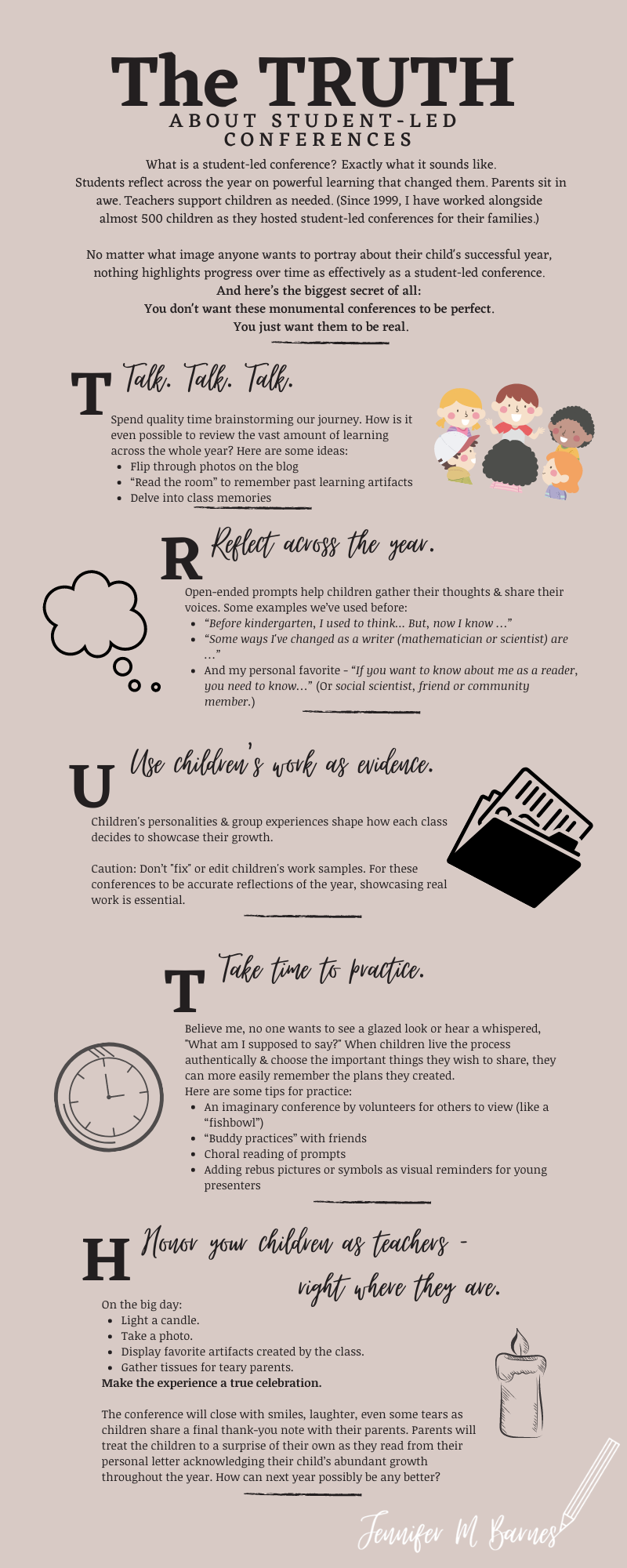
More Inspiration Coming for those committed to student led parent teacher conferences…
Hopefully, the podcast episodes and details here have inspired you to begin preparing for children reflecting well across the year. Be on the lookout for the next blog post where I go into depth about children visualizing and conquering the remaining phases of this significant milestone.

Pingback: Kindergarten Self Assessment At Its Finest: How to Accomplish Unforgettable Student Led Conferences - Jennifer M. Barnes
Pingback: How To Host An Inspirational Writing Workshop in Kindergarten From Day One - Jennifer M. Barnes